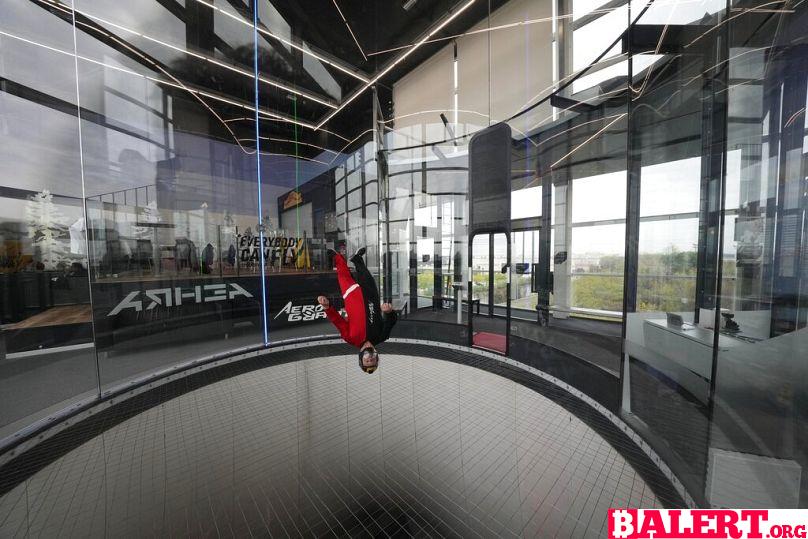World
The Financial Challenges Facing Europe’s Tech Startups
Explore the financial challenges confronting Europe’s tech startups, from funding shortages to market volatility. Discover insights on how these companies can navigate obstacles and thrive in a competitive landscape.

Why is Europe Struggling to Create Its Own Google, Amazon, or Facebook?

The question of why the European Union (EU) has yet to produce its own tech giants akin to Google, Amazon, or Facebook is a complex one. Many speculate that the continent may be lacking in entrepreneurship, technical expertise, or even the imaginative vision necessary for such groundbreaking innovations. However, the reality is that the EU actually outperforms the US in terms of generating high-tech start-ups. The underlying issue lies in the financing of these ventures. The solution is straightforward and has been overlooked for years: the crux of the matter is money.
In fact, over the past five years, the EU has successfully launched more high-tech start-ups than the US. Yet, a significant number of these enterprises fail to scale up, while others relocate to more favorable environments across the Atlantic.
Europe’s Timidness on Display
A fundamental reason for this predicament is the cautious nature of European investors. Many Europeans lack the financial sophistication required to make informed investment choices. In the EU, a staggering 31% of household savings are held in cash or deposits, compared to just 12% in the US. This disparity leaves less room for engagement with stocks and bonds within the union. Consequently, the EU banks are awash with deposits, holding twice as much money relative to GDP as their US counterparts, while their capital markets for stocks are only half as robust. The situation is similar for bonds.
European institutions have been aware of this issue for years and occasionally manage to allocate one or two billion euros toward funding start-ups. While this is a positive step, it pales in comparison to the vast scale of the funding gap.
This lack of financial backing has dire consequences for innovation. Approximately 80% of financing for EU firms is derived from bank loans, which is clearly not an ideal mechanism for funding high-risk start-ups. These ventures typically lack a proven track record and possess primarily intangible assets that are unsuitable for use as collateral.
When examining the landscape of finance for start-up companies, the situation becomes even more alarming. The US boasts 20 times more venture capital than the EU, with €1.3 trillion compared to a mere €72 billion in Europe.
Related
- European startups should collaborate with NGOs pro bono
- European cities are transforming fallen leaves into shopping bags and paper
Moreover, firms that are not yet prepared to go public through an IPO struggle to secure venture capital or private equity funding, receiving on average only one-fifth of the venture capital or one-twentieth of the private equity funding available to their US counterparts.
Despite the occasional influx of funding from European institutions, the amounts allocated are insignificant when viewed against the enormity of the challenge.

How Did the US Achieve Its Silicon Valley?
Often overlooked in this discussion is an understanding of how the US cultivated its Silicon Valley. Certainly, brilliant and enterprising technologists played a role, as did government funding for research initiatives. However, a pivotal change occurred with the enactment of the Employee Retirement Income Security Act (ERISA) in 1974, which transformed the regulation of pension funds. Prior to ERISA, pension funds were largely restricted to safe investments. The legislation altered this landscape by acknowledging that a “prudent person” would typically seek a portfolio that included a blend of riskier instruments. This change unleashed a significant influx of pension fund capital into venture capital, making the evolution of Silicon Valley as we know it today possible.
Today, the EU finds itself in a similar situation to that of the pre-ERISA US, and this is a critical reason why the notion of a “European Silicon Valley” remains elusive.
However, this need not be the case. EU pension funds currently hold assets totaling around €4 trillion, while the insurance sector, which includes pension-like plans, boasts assets of approximately €9 trillion. Although pension funds do invest billions into venture capital annually, these investments represent a mere fraction—less than one-hundredth of 1% of their total assets.
Related
- Innovative startups and new technologies are revolutionizing agriculture in Poland
- Scaling up: The reasons why new companies bring in new CEOs
There is no shortage of promising EU firms ripe for investment. In fact, the EU generates more start-ups than the US each year, with venture capital returns running about 6% higher in Europe. The average returns on venture capital investments in the EU are around 29%, characterized by surprisingly low volatility.
Clear and Straightforward Measures Needed
One might instinctively argue against pension funds investing in high-risk ventures for the sake of future pensioners, but this perspective overlooks a crucial point. Investment advisors typically recommend diversification in portfolios, which should include a mix of risk-return profiles aligned with individual investment goals. Pension funds recognize this, and many are eager to shed overly restrictive regulations imposed by member states.
A twenty-fold increase in pension funds’ current investments in venture capital could effectively triple the EU’s annual contribution to this sector, all while still representing less than 0.2% of pension funds’ assets. This approach would not only benefit the digital sector but also enhance the performance of our pension funds, insurance sector, and ultimately, the financial security of future pensioners.
While concerns may arise regarding those nearing retirement, implementing straightforward rules or guidelines could help mitigate the risks associated with high-risk investments for this demographic.
In summary, the measures necessary to enable the EU to cultivate large-scale digital champions are clear and actionable. The path forward promises to enhance not only Europe’s digital landscape but also the well-being of its pension funds and citizens. The only obstacles in our way are a sense of timidity, conservatism within Europe, and a lack of a comprehensive policy framework to implement these essential changes.
J. Scott Marcus is an economist, engineer, and public policy analyst. He serves as an Associate Senior Research Fellow in the Global Governance, Regulation, Innovation, and Digital Economy (GRID) Unit at the Centre for European Policy Studies (CEPS).
At Euronews, we believe that every perspective matters. We invite you to reach out to us at view@euronews.com to share your pitches or submissions and become part of the ongoing conversation.
World
Dominique Pelicot Testifies in Harrowing Rape Trial
Join us as Dominique Pelicot courageously testifies in a harrowing rape trial, shedding light on the complexities of trauma and justice. Her powerful story raises crucial questions about the legal system and the importance of support for survivors.

Dominique Pelicot Takes the Stand in Shocking Rape Trial
In a courtroom drama that has captivated France and garnered international attention, Dominique Pelicot, the man at the center of a harrowing rape trial, finally addressed the court. With tears streaming down his face, he recounted how his wife had been instrumental in helping him cope with a tumultuous past marked by trauma. He revealed that he had endured a sexual assault at the tender age of nine while hospitalized, and he also witnessed a gang rape during his teenage years while working as an apprentice electrician on a construction site.
“She didn’t deserve this, I acknowledge that,” Mr. Pelicot stated, his voice barely audible as he struggled to convey his emotions. The gravity of the situation weighed heavily on him, and the courtroom fell silent, straining to catch his every word.
Now 71 years old, Mr. Pelicot faces serious allegations of drugging his wife, Gisèle Pelicot, whom he has been married to for half a century, over a span of nearly ten years. Prosecutors contend that he used drugs to render her comatose, allowing him to rape her repeatedly. Furthermore, authorities allege that he went so far as to invite numerous men into their home, facilitating a nightmarish scenario where they, too, engaged in the assault of his wife.
Overall, 51 men, including Mr. Pelicot, are on trial concurrently, primarily facing charges related to the aggravated rape of Ms. Pelicot. Among them, one individual has already pleaded guilty to similar crimes, admitting to drugging his own wife to assault her and inviting Mr. Pelicot to partake in the horrific act while she was incapacitated.
Mr. Pelicot’s unexpected testimony came after a tumultuous start to the trial. Just a week in, he was stricken with severe health issues that forced him to miss four consecutive days in court. The head judge ultimately decided to postpone proceedings, as Mr. Pelicot was diagnosed with kidney stones, a kidney infection, and prostate complications, adding yet another layer of complexity to this already harrowing case.
World
Meta Bans Russian State Media Outlets from Social Media Platforms
Explore the implications of Meta’s decision to ban Russian state media outlets from its social media platforms. Understand the impact on information dissemination and the ongoing battle against misinformation in the digital landscape.

Meta Imposes Global Ban on Russian State Media Outlets
In a significant move, Meta Platforms, Inc., the parent company of Facebook, has announced the prohibition of Russian state media outlets, including RT (Russia Today) and Rossiya Segodnya, from all its social media platforms. The decision stems from the company’s concerns regarding the deceptive strategies employed by these media organizations to execute covert influence operations across the internet.
Meta made this announcement on Monday, emphasizing that the ban will be enforced worldwide across its various platforms, such as Instagram, WhatsApp, and Threads. The rollout of this ban is expected to take place over the coming days.
Statement from Meta
A spokesperson for Meta elaborated on the decision, stating, “After careful consideration, we have expanded our ongoing enforcement actions against Russian state media outlets. As a result, Rossiya Segodnya, RT, and other affiliated entities are now banned from our applications globally due to their involvement in foreign interference activities.”
For further insights into this development, watch the video in the player above.
World
Trump Recalls Alleged Assassination Attempt While Golfing
Explore Donald Trump’s chilling recollection of an alleged assassination attempt he experienced while enjoying a round of golf. Delve into the tense moments and his reflections on safety, fame, and the unpredictability of public life.

In a recent interview on the social media platform X, Republican presidential nominee Donald Trump recounted a harrowing incident he claims to have experienced while playing golf. Trump described how, during a peaceful Sunday morning round with friends, the tranquility of the day was abruptly shattered by the sound of gunfire in the air.
“It was a beautiful day, everything was just perfect,” Trump reflected. “Then all of a sudden, we heard shots being fired—probably around four or five in total.” He went on to explain that a Secret Service agent was the first to spot the suspect, who was allegedly armed with an AK-47, a powerful assault rifle.
“The agent saw the barrel of the weapon and immediately took action, returning fire at the barrel and aiming in the direction of the bushes,” Trump detailed. “I would have loved to have sunk that last putt, but we decided it was best to leave the scene promptly.”
Trump expressed his gratitude towards the agents and a vigilant civilian who aided in tracking down the suspect, who was eventually apprehended following a high-speed chase.
Suspect Faces Multiple Federal Gun Charges
The FBI has identified the suspect as Ryan Wesley Routh, accusing him of targeting Trump during his time at the golf club in West Palm Beach, Florida. According to an FBI report, Routh had allegedly hidden among the hedges of the golf course for an astonishing 12 hours. Authorities discovered an SKS-style assault rifle, a GoPro camera, and a bag of food at the scene.
The 58-year-old Routh is now facing two serious federal gun charges. If convicted on both counts, he could face a combined maximum sentence of 20 years in prison. Notably, neither of the charges is directly related to an assassination attempt. The first charge pertains to possessing a firearm despite a prior felony conviction, which carries a potential 15-year sentence, a fine of $250,000 (€225,000), and three years of supervised release.
The second charge involves possession of a firearm with an obliterated serial number, which could result in a five-year prison term, the same financial penalties, and also three years of supervised release. As the investigation continues, additional charges could be forthcoming.
While the motive behind Routh’s actions remains unclear, his digital footprint reveals strong political affiliations, particularly concerning issues surrounding Ukraine and China. Routh consistently expressed support for Ukraine across various social media platforms, even claiming to have orchestrated a recruitment scheme for international volunteers aiming to assist Ukraine in its fight against Russia’s invasion. This behavior has been denounced by Ukrainian soldiers and members of the International Legion, who disavowed Routh’s actions and motives.
-

 Business5 months ago
Business5 months agoThe Significance of Jackson Hole: A Central Banking Tradition
-

 Tech4 months ago
Tech4 months agoNew Leaks and Features About the Samsung Galaxy S25 Ultra
-

 Business6 months ago
Business6 months agoObituary: Dan Collins
-

 Article7 months ago
Article7 months agoCreative Design Applications Developed with Artificial Intelligence
-

 Business4 months ago
Business4 months agoBhutan’s Strategic Investment in Bitcoin: A New Era for the Himalayan Kingdom
-

 World4 months ago
World4 months agoThierry Breton Resigns: Impact on European Union Leadership
-

 Gaming4 months ago
Gaming4 months agoNew Details and Trailer Released for Dead Rising Deluxe Remaster
-

 Gaming4 months ago
Gaming4 months agoNew Details for Alan Wake 2 and PlayStation 5 Pro Announcement












